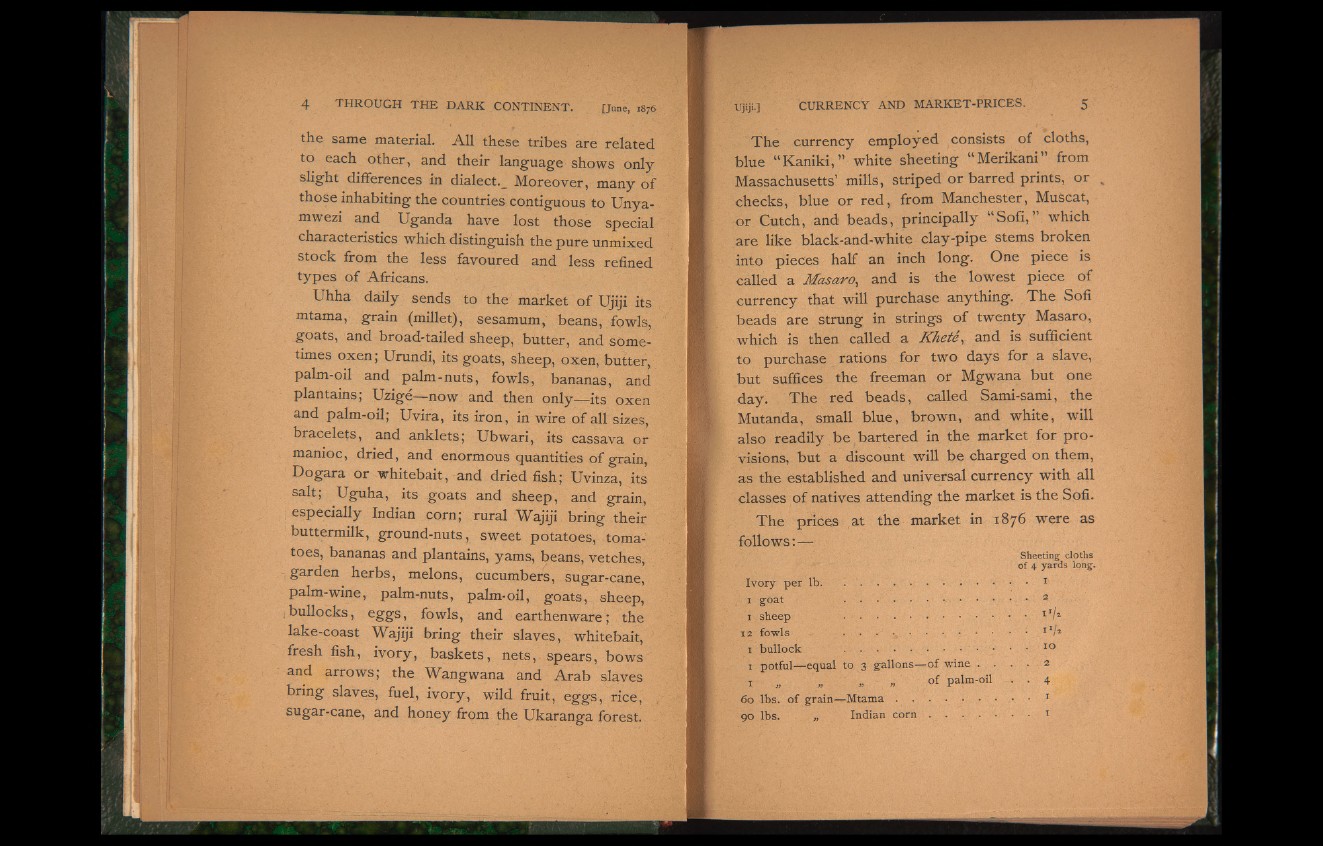
the same material. All these tribes are related
to each other, and their language shows only
slight differences in dialect._ Moreover, many of
those inhabiting the countries contiguous to Unya-
mwezi and Uganda have lost those special
characteristics which distinguish the pure unmixed
stock from the less favoured and less refined
types of Africans.
Uhha daily sends to the market of Ujiji its
mtama, grain (millet), sesamum, beans, fowls,
goats, and broad-tailed sheep, butter, and sometimes
oxen; Urundi, its goats, sheep, oxen, butter,
palm-oil and palm-nuts, fowls, bananas, and
plantains; Uzige—now and then only—-its oxen
and palm-oil; Uvira, its iron, in wire of all sizes,
bracelets, and anklets; Ubwari, its cassava or
manioc, dried, and enormous quantities of grain,
Dogara or whitebait, and dried fish; Uvinza, its
salt; Uguha, its goats and sheep, and grain,
; especially Indian corn; rural Wajiji bring their
buttermilk, ground-nuts, sweet potatoes, tomatoes,
bananas and plantains, yams, beans, vetches,
- garden herbs, melons, cucumbers, sugar-cane,,
palm-wine, palm-nuts, palm-oil, goats, sheep,
¡bullocks, eggs, fowls, and earthenware; the
lake-coast Wajiji bring their slaves, whitebait,
fresh fish, ivory, baskets, nets, spears, bows
and arrows; the Wangwana and Arab slaves
bring slaves, fuel, ivory, wild fruit, eggs, rice,
sugar-cane, and honey from the Ukaranga forest.
The currency employed consists of cloths,
blue “Kaniki,” white sheeting “Merikani” from
Massachusetts’ mills, striped or barred prints, or „
checks, blue or red, from Manchester, Muscat,
or Cutch, and beads, principally “ Sofi,” . which
are like black-and-white clay-pipe stems broken
into pieces half an inch long. One piece is
called a Masaro, and is the lowest piece of
currency that will purchase anything. The Sofi
beads are strung in strings of twenty Masaro,
which is then called a Khete, and is sufficient
to purchase rations for two days for a slave,
but suffices the freeman or Mgwana but one
day. The red beads, called Sami-sami, the
Mutanda, small blue, brown, and white, will
also readily be bartered in the market for provisions,
but a discount will be charged on them,
as the established and universal currency with all
classes of natives attending the market is the Sofi.
The prices at the market in 1876 were as
follows:—
Sheeting cloths
of 4 yards long.
Ivory per lb......................................................................1
1 goat...................................................... ............................2
1 sheep................. ............................................................. 11/*
12 fowls . . . . . . .............................1 */*
1 bullock 10
1 potful— equal to 3 gallons— o f wine . . . . 2
x i „ „ , » ° f palm-oil . . 4
60 lbs. o f grain— M t am a ....................................... ..... 1
90 lbs. Indian c o r n ................................................1